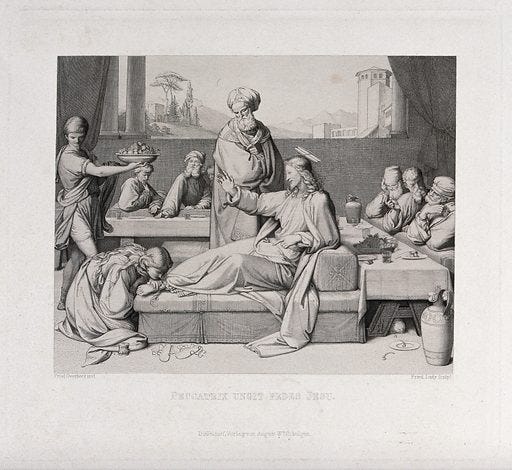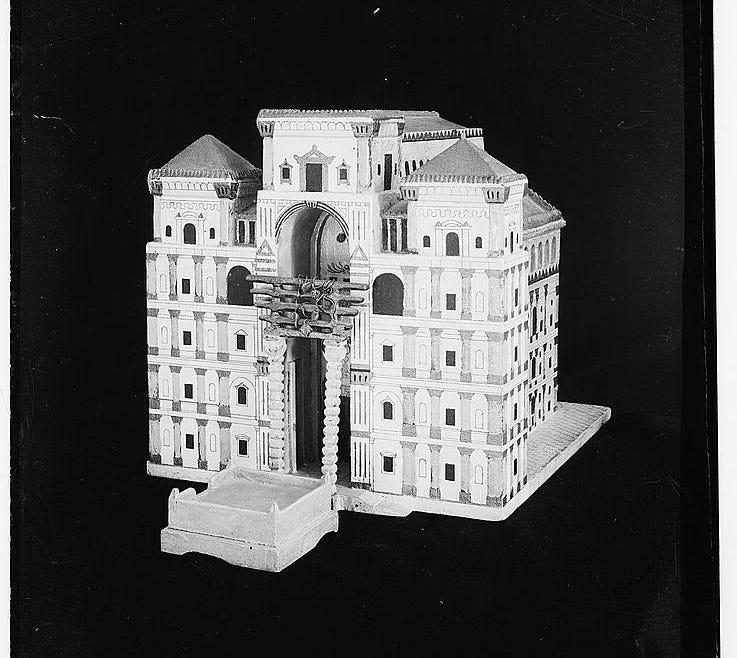More than They Bargained For
Description
More than than They Bargained For
Mark 14:53-62, Remsen Bible Fellowship, 06/15/2025
Introduction
Revelation 1:5b-7, “To him who loves us and has freed us from our sins by his blood and has made us a kingdom, priests to his God and Father, to him be glory and dominion forever and ever. Amen. Behold, he is coming with the clouds, and every eye will see him, even those who pierced him, and all tribes of the earth will wail on account of him. Even so. Amen.”
Turn with me in your Bibles to Mark’s gospel, chapter 14.
They had all run. Fled. Turned tail and disappeared into the darkness in a desperate attempt to avoid being taken, with him, by the authorities. The mob with their swords and clubs marched him off into that same night, headed back into the city.
Their destination? The home of Ciaphas, the high priest. There, in his large upper room, the council of elders and chief priests and scribes came together. The seventy men of the Sanhedrin, not meeting in the market halls as they normally would, but instead gathered in this home. No gathering of this size could rightly be called secret, but the darkness of the event was pregnant with meaning. The workers of darkness had gathered under the cover of night in order to do the works of darkness. Verse 53, “And they led Jesus to the high priest. And all the chief priests and the elders and the scribes came together.”
But for the reader, we feel a flicker of hope when we read the following verse. 54, “And Peter had followed him at a distance, right into the courtyard of the high priest. And he was sitting with the guards and warming himself at the fire.” Here is Peter, who had boldly pledged his allegiance to Jesus in v29 & v31, had impulsively cut off an ear in v47, and then turned tail with the rest of the disciples in v50—he’s back. He followed—yes, at a distance, but followed nonetheless. He has not utterly abandoned his Lord.
But he is hanging back. Outside the home of Ciaphas the high priest, Peter stands out here warming his hands against the chill of a cool spring night. Far enough to, hopefully, not be noticed. But near enough to hear what’s happening inside.
And what’s happening inside could best be described as a banana court, a proceeding that has nothing to do with the execution of justice and everything to do with looking for a pretense to convict. The courtroom has more in common with a lynch mob than a hall of justice. The chief priests and the council weren’t looking for the truth—they were looking for a pretense: V55-56,
Now the chief priests and the whole council were seeking testimony against Jesus to put him to death, but they found none. For many bore false witness against him, but their testimony did not agree.
They sought testimony to condemn him, but they couldn’t find any. The reason is simple, and Pilate will identify it in the following chapter (15:14 ): Jesus had never done or said anything evil. He had never broken any law, let alone a law which carried the death penalty.
That doesn’t stop our enterprising adversaries from trying to get witnesses for their cause, though. You don’t need much imagination to picture the same people who had paid Judas to turn Jesus over also finding a whole stable of false witnesses—many bore false witness against him—but the problem was they hadn’t paid enough money to get their story straight. We can be understanding, of course: they were in a hurry, what with this hurried nighttime courtroom scene. No one had time between changing out of their pajamas and rushing down to Ciaphas’ house to stop for a story-coordination meeting.
Mark even gives us an example of one piece of false testimony in v57-59,
And some stood up and bore false witness against him, saying, “We heard him say, ‘I will destroy this temple that is made with hands, and in three days I will build another, not made with hands.’” Yet even about this their testimony did not agree.
Now, if you are familiar with the gospels, and the words Jesus spoke, what these witnesses say might sound familiar—you might catch yourself thinking, wait, didn’t Jesus say something like this? Are these false witnesses wrong? And the answer is yes, they are wrong. And that’s why they can’t agree—because their details are all jumbled up. Jesus certainly said some very offensive and shocking things concerning the temple, but never once did he claim that he would tear it down himself.
What the accusers seem to be doing is mixing and mashing together two separate sayings of Jesus. The first is found in John chapter 2. The setting in this chapter is that Jesus has just entered—and then forcefully cleared—the temple. In verse 15 of John 2, Jesus makes a whip out of cords, and then drives the sheep, oxen, money-changers, and pigeons out of the temple courts. He then proceeds to dump out the money at the exchange booth, and toss their tables. He’s made a rather grand entrance to Jerusalem, you might say.
And the Jews—a term that, in John’s gospel, usually refers to the leadership class in Jerusalem…the very same men who have Jesus on trial three years later—demand a “sign” for “doing these things”. Jesus replies with these words: “destroy this temple, and in three days I will raise it up” (v19). Now, does he say anything in there about him destroying the temple? No, in fact, he lays the impetus for that action at their feet. The Jerusalem leadership class will be the ones who destroy God’s temple. But what does Jesus say he will do? “In three days, I will raise it up.” And the gospel writer tells us two verses later that “he was speaking about the temple of his body.” He predicted that the leadership class would kill his body. But not permanently.
Nonetheless, you could see where the accusers might get the idea about a temple not made with hands, and the fact that Jesus would build it inside of three days. The other place we find Jesus speaking about the destruction of the temple is earlier in Mark, in chapter 13. In Mark 13:2, Jesus tells his disciples that not one stone will be left upon another, in the day of the temple’s destruction. There he clearly was speaking about the destruction of the temple “made by hands.” Nonetheless, does he claim that he will personally be the one doing the destroying? No. Though, as I argued when we went through Mark 13, Jesus is the Lord of history and therefore superintended the destruction of the temple, specifically as an act of judgement upon the Jewish people for their rejection of the Messiah, he still was not claiming that he was going to show up personally with a sledge and a jackhammer. Rather, he used the Roman General Titus to accomplish that fact some forty years later.
So, what we find in the gospels is that Jesus did predict the downfall of the temple. And he did predict his own bodily resurrection from the dead. But never once did he threaten any crime, nor did he violate the law of God.
The Sanhedrin knows that Jesus is innocent. The witnesses know that Jesus is innocent. The dogs and the cats in the vicinity know that Jesus is innocent—everybody knows. Mark makes repeated reference to the fact that the witness testimony didn’t line up.
So what kind of brilliant defense does Jesus marshal against these false accusations? Short answer: none. Verse 60 and on in to v61 says, “And the high priest stood up in the midst and asked Jesus, ‘Have you no answer to make? What is it that these men testify against you?’ But he remained silent and made no answer.” Reading this scene reminds me of Isaiah 53:7, “He was oppressed, and he was afflicted, yet he opened not his mouth; like a lamb that is led to the slaughter, and like a sheep that before its shearers is silent, so he opened not his mouth.”
In standing silent and simply receiving the hurled insults and accusations of the religious and political insiders, Jesus fulfilled in part the picture of the suffering servant of Isaiah 53. Further, I think he is putting on beautiful display that truth of Proverbs 26:4—“Answer not a fool according to his folly, lest you be like him yourself.” Jesus knows these men don’t care about the truth of any of their accusations—why would he waste breath in correcting them?
It’s not the point of the passage here, but a useful note in our hyper-offendable age: you don’t have to answer every accusation, you don’t have to correct every wrong thought or idea even if the falsehood is aimed against you. Andie has joked that on my headstone she will place the words, “Well, actually…” — so I’m speaking from experience when I say that there is a temptation to vindicate yourself, to fix all the bad thinking, to refute every falsehood, and to really be under the illusion that such actions and words will amount to something more than a waste of breath—and usually that’s just not true. Especially if you are wasting time arguing with people in comment sections or on Facebook, save yourself some gray hair and just stop. Jesus is a model here. They throw false accusations against him, the chief priest knows their false but is hoping that he will respond with something they can prosecute for—but Jesus gives him nothing.
Turn
Nothing, that is, until he asks a direct, pointed, question: v61b, “Again the high priest asked him, ‘Are you the Christ, the Son of the Blessed?”
As we’re reading this, the questions can fill our mind—how will Jesus answer this one? Will he remain silent, still? Mark’s gospel has often been called the gospel of secrecy, because Jesus’ identity as the Christ, the Jewish Messiah—while clear to the reader from the very first verse—is hidden from so many until the back end of the book. Jesus repeatedly silences those who woul
























